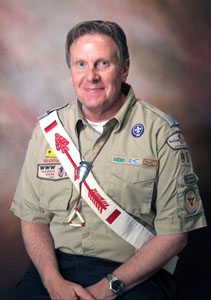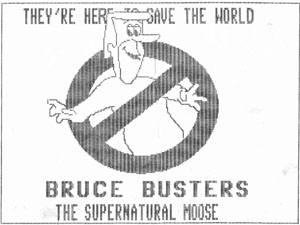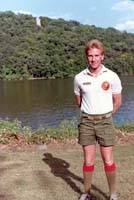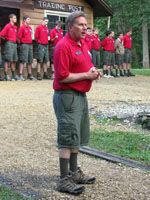
|
Home
|
Bruce A. SmallThe 1970s was a decade of change. A constant turnover in staff members and camp directors, as well as the merger of two councils and two years of a "dual-staff," resulted in the loss of many camp traditions. However, the arrival of Dale Smith and then Bruce Small in the late 1970s would begin a revitalization period.  Bruce A. Small was born in Peoria, Illinois, but grew up in East Peoria. An honor student, he graduated from East Peoria Community High School in 1974 in the top ten of his class of 467. He then attended Augustana College in Rock Island, Illinois, where he served as president of his dorm and as vice president of his fraternity. He also served as head of the dorm council (the judiciary committee for the dorm). As a boy Bruce was involved in Cub Scouts. However, when it came time to move on to Boy Scouts, a troop did not exist in the area where his family lived. Several parents in the troop, including Bruceís, tried to start a troop but could not get the support needed. Once he began to teach, the boys in his class approached him to ask if he would be their assistant Scoutmaster. That was the beginning of Bruceís Scout experience as an adult. He recalls, I just loved it. I would take my flashlight and schoolwork on campouts, grading papers in my tent at night. I did not want to miss the campouts, but still had to get my schoolwork done.While with the troop, he attended several summer camps and became one of the first adults to go through voyager training at the Region 7 Canoe Base in Wisconsin. It was an experience that Bruce credits with teaching him most of the Scout skills that he still retains today. Once he moved to the Galena area he was quick to join the local troop, Troop 95, where he has served as assistant Scoutmaster and Scoutmaster. He also became involved beyond the troop level by serving as district roundtable commissioner for four years and also as Order of the Arrow chapter adviser. Through these involvements he came into contact with Dale Smith and Dennis Pratt. Bruce recalls, One day in 1979 I received a call from Dale Smith. He wanted to know if I would be willing to serve as business manager on the Camp Lowden staff. Having always wanted to do something like that, I told Dale that I would do it, but that I did not know what to do. Dale said thatís ok, this is my first time too and I donít know what to do either! So I said, "Yes," and agreed to something that would change my life for many, many years.In the years that followed, Bruce was camp director, business manager, and health officer, holding all three positions in an attempt to save money to provide better salaries for other staff members. He rewrote the record-keeping and financial systems of the camp and still uses those systems today. Once the national standards were changed to preclude the camp director from having other responsibilities, he began to hire a separate health officer. Because the business aspect of the camp is relatively simple and the system was of his design and understanding, he was allowed to retain the business manager position with no objection. Over the years Bruce has been the center of attention for many humorous incidents at camp. The staff pokes a lot of fun at Bruceís expense, with affection of course, and he responds as the perfect straight man. It is all in good fun, and the Scouts absolutely love it! Steve Sarver recalls, In 1980 there was a running gag about the "horrible" odor of Bruceís socks. Every time something smelled bad in camp, no matter how small [pun intended], the smell would be blamed on Bruceís socks. The staff even made up a song about it, based on the popular camp song, "Your Mama Donít Wear No Socks." The Scouts were encouraged to come up with their own verses.Chuck Walneck recalls, In 1979 a competition between Bruce Small and I started and continued for more than a decade and a half. Bruce usually picked the challenge and practiced until the July 4th week. He usually felt confident that he had the advantage, but he never won a challenge. One year his challenge was the "toggle toss." It turned into a camp-wide event, with half the kids favoring Bruce and the other half and some staff members favoring me. It was a daily struggle to continue to hold the best time and camp record. The culmination of this competition was concluded in good sportsmanship by shaking hands and going to the Trading Post where the loser would provide "Mickey Mouse" ice cream bars to the all of the kids (the Mickey Mouse bars are a whole story in itself).Tom Heintzelman recalls a swim race with Bruce in 1983: The race was really hyped and well attended. After the start I glanced back and there was Bruce way back behind me. I think he gave out after two or three strokes. Needless to say I won by a pool length.During the Wednesday family nights in the early 1980s there was a water carnival after supper, with competitions between troops. The highlight of the carnival was always the "biggest splash" contest. As emcee of the event Bruce always managed to get splashed at least once. One year a "Scoutmastersí biggest splash" contest was held between the leaders. Letís just say that the splashes were even bigger and leave it at that. In recent years, Bruce has participated in a water balloon toss. They are always fun to watch, and someone usually gets soaked. In recent years Bruceís bed has ended up in a variety of different and unusual places, such as the top of the climbing tower and even the bottom of the swimming pool! But while Bruce is often the subject of much humor, he also has a serious side. One must remember that in the "off-season" he is a teacher, and his first and foremost goal is to educate. This includes summer camp, which after all is an outdoor educational experience. He wants Scouts to have the best possible experience at summer camp, and to have such a great time that they will not forget it. Whatever he or the staff needs to do to make this happen, they will do. Steve Sarver recalls, One week there was a Scout who was terribly homesick. At various times we would see Bruce sitting on the step talking to him, offering advice and encouragement, etc. The Scout made it through the rest of the week and had a great time. At the closing campfire Bruce gave him a "Good Turn" coin, something that he does on special occasions.Tim Gaston recalls, I am thankful for the many things that Bruce taught me as well as others over the years, such as an honest, hard dayís work, and how to lead others. He also taught me all sorts of little things, such as how to endorse my payroll check, do my own laundry, and various other life skills.Steve Sarver recalls, When we planned the closing campfire for the 2005 staff reunion, the last item on the program was "Bruce concludes the campfire." That is all we needed to do. We knew that he would come up with just the right things to say, to bring everybody from the different eras together, and he did not disappoint. He is without question the best campfire presenter since Bill Mulford, and possibly even better. I wish they had the chance to meet, because I think they would get along great.Bruce concludes, The thing that means the most to me during my tenure is all of the staff members who have served Camp Lowden. They have become the champions that our world so badly needs today. All of them continue to live the Scout Oath and Law each and every day, setting the example for all who come in contact with them. Through them the Spirit of Camp Lowden will live forever. I love them all and thank them for enriching my life. They are my heroes!Bruce served for 35 years as a Camp Lowden staff member, all but two of which were as camp director. He has been recognized by the Order of the Arrow with the Vigil Honor. He has also received the Silver Beaver Award. In 1990 Bruce gave a moving speech at the campís 50th Anniversary celebration: I have had the privilege to see firsthand the many changes that have taken place at Camp Lowden. 


|